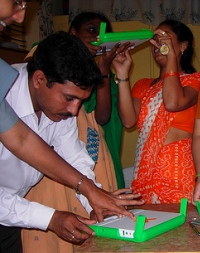That's the brilliant plan conceived by the Ministry of IT and Communications - computer rental for Indians in rural areas. They'll start in 5 locations, reports The Economic Times:
"The cost may vary from 15-20 [rupees] per day. This model may remove the hindrance of affordability in buying computers. We are talking to various companies like Intel, HCL Infosystems and One Laptop Per Child Project," a senior official at ministry of IT & communications told ET. "It will also remove the problem of maintenance and repair which is a common problem in many areas. Besides the person can rent it only for the time power is available," he added.
This Computer Rental Scheme will Fail
I'm not sure what rural area this minister was referring to, but it might be his back yard. Anywhere farther afield, and the very issues he trivializes will be insurmountable obstacles.
- Lack of Electricity: The largest issue is electricity, because suitable electricity is so rare. Rural areas of India do not have electrical power. If they do, it is of varying voltage that can cause computer brownouts, which are even more harmful than blackouts.
- Maintenance & Support: Now let's say there is electricity, just who is going to support the computers? In a hot, dusty, rural environment there will be a need for constant maintenance, even with XO laptops.
- Lack of Experience: But the real deal killer is the very people who will be renting these computers - inexperienced users. If they don't know how to use a computer, and there isn't someone there to train them, then the computers will be very expensive rental bricks.
Community Centers are Better
Rather than thinking of the personal usage model, where costs grow exponentially with scale, the Ministry of IT & Communications should try installing a shared-use computer lab in a community center. This will give exposure to computers in a setting that allows for the needed infrastructure - electricity, maintenance, user training - to be concentrated for rural users. From the lab, experienced users with electrical power could borrow computers to extend usage.
It's a model that's worked well in India and around the world, and can be an intermediary step to community usage of computers in the home and home businesses.


